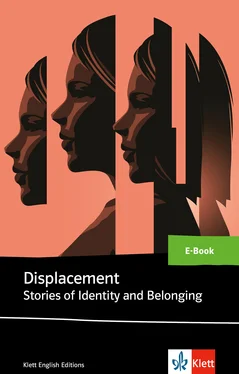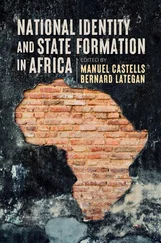Andrea Levy - Displacement Stories of Identity and Belonging
Здесь есть возможность читать онлайн «Andrea Levy - Displacement Stories of Identity and Belonging» — ознакомительный отрывок электронной книги совершенно бесплатно, а после прочтения отрывка купить полную версию. В некоторых случаях можно слушать аудио, скачать через торрент в формате fb2 и присутствует краткое содержание. Жанр: unrecognised, на немецком языке. Описание произведения, (предисловие) а так же отзывы посетителей доступны на портале библиотеки ЛибКат.
- Название:Displacement Stories of Identity and Belonging
- Автор:
- Жанр:
- Год:неизвестен
- ISBN:нет данных
- Рейтинг книги:5 / 5. Голосов: 1
-
Избранное:Добавить в избранное
- Отзывы:
-
Ваша оценка:
- 100
- 1
- 2
- 3
- 4
- 5
Displacement Stories of Identity and Belonging: краткое содержание, описание и аннотация
Предлагаем к чтению аннотацию, описание, краткое содержание или предисловие (зависит от того, что написал сам автор книги «Displacement Stories of Identity and Belonging»). Если вы не нашли необходимую информацию о книге — напишите в комментариях, мы постараемся отыскать её.
Andrea Levy: Loose Change
Shereen Pandit: She Shall Not Be Moved
Saeed Taji Farouky: The Rain Missed My Face and Fell Straight to My Shoes
Jhumpa Lahiri: The Third and Final Continent
Qaisra Shahraz: The Escape
Displacement Stories of Identity and Belonging — читать онлайн ознакомительный отрывок
Ниже представлен текст книги, разбитый по страницам. Система сохранения места последней прочитанной страницы, позволяет с удобством читать онлайн бесплатно книгу «Displacement Stories of Identity and Belonging», без необходимости каждый раз заново искать на чём Вы остановились. Поставьте закладку, и сможете в любой момент перейти на страницу, на которой закончили чтение.
Интервал:
Закладка:
“Have you a five-pound note as well?” I asked.
She dropped the coins on to the basin area, spreading them out into the soapy puddles of water that were lying there. Then she said, “You look?” She had an accent but I couldn’t tell then where it was from; I thought maybe Spain.
“Is this all you’ve got?” I asked. She nodded. “Well look, let me just take this now …” I picked three coins out of the pile. “Then I’ll get some change in the shop and pay them back to you.” Her gaze was as keen as a cat with string. “Do you understand – only I don’t want all those coins?”
“Yes,” she said softly.
I was grateful. I took the money. But when I emerged from the cubicle, the girl and her handful of change were gone.
I found her again, staring at the portrait of Darcey Bussell. She was inclining her head from one side to the other as if the painting were a dress she might soon try on for size.
I approached her about the money but she just said, “This is good picture.”
Was it my explanation left dangling or the fact that she liked the dreadful painting that caused my mouth to gape?
“Really, you like it?” I said.
“She doesn’t look real. It looks like…” Her eyelids fluttered sleepily as she searched for the right word. “A dream.”
That particular picture always reminded me of the doodlesgirls drew in their rough booksat school.
“You don’t like?” she asked.
I shrugged.
“You show me one you like,” she said.
As I mentioned before, I’m not in the habit of making friends with strangers, but there was something about this girl. Her eyes were encircled with dark shadows so that even when she smiled – introducing herself cheerfully as Laylor – they remained as mournful as a glumkid at a party. I took this fraternisationas defeat but I had to introduce her to a better portrait.
Alan Bennettwith his mysterious little brown bag didn’t impress her at all. She preferred the photograph of David Beckham. Germaine Greermade her top lip curl and as for A.S. Byatt, she laughed out loud. “This is child make this?”
We were almost creating a scene. Laylor couldn’t keep her voice down and people were beginning to watch us. I wanted to be released from my obligation.
“Look, let me buy us both a cup of tea,” I said. “Then I can give you back your money.”
She brought out her handful of change again as we sat down at a table – eagerly passing it across for me to take some for the tea.
“No, I’ll get this,” I said.
Her money jangledlike a win on a slot machineas she tipped it back into her pocket. When I got back with the teas, I pushed over the twenty-pences I owed her. She began playing with them on the tabletop – pushing one around the other two in a figure of eight. Suddenly she leant towards me as if there were a conspiracy between us and said, “I like art.” With that announcement a light briefly came on in those dull eyes to suggest that she was no more than eighteen. A student, perhaps.
“Where are you from?” I asked.
“Uzbekistan,” she said.
Was that the Balkans? I wasn’t sure. “Where is that?”
She licked her finger, then with great concentration drew an outline on to the tabletop. “This is Uzbekistan,” she said. She licked her finger again to carefully plop a wet dot on to the map saying, “And I come from here – Tashkent.”
“And where is all this?” I said, indicating the area around the little map with its slowly evaporating borders and town. She screwed up her faceas if to say ‘nowhere’.
“Are you on holiday?” I asked.
She nodded.
“How long are you here for?”
Leaning her elbows on the table she took a sip of her tea. “Ehh, it is bitter!” she shouted.
“Put some sugar in it,” I said, pushing the sugar sachets toward her.
She was reluctant. “Is for free?” she asked.
“Yes, take one.”
The sugar spilled as she clumsilyopened the packet. I laughed it off but she, with the focus of a prayer, put her cup up to the edge of the table and swept the sugar into it with the side of her hand. The rest of the detritusthat was on the tabletop fell into the tea as well. Some crumbs, a tiny scrap of paper and a curly black hair floated on the surface of her drink. I felt sick as she put the cup back to her mouth.
“Pour that one away, I’ll get you another one.”
Just as I said that a young boy arrived at our table and stood legs astride before her. He pushed down the hood on his padded coat. His head was curious – flat as a cardboard cut-out – with hair stuck to his sweaty forehead in black curlicues. And his face was as doggedlydetermined as two fists raised. They began talking in whatever language it was they spoke. Laylor’s tone was pleading; the boy’s aggrieved. Laylor took the money from her pocket and held it up to him. She slapped his hand away when he tried to wrest all the coins from her palm. Then, as abruptly as he had appeared, he left. Laylor called something after him. Everyone turned to stare at her, except the boy, who just carried on.
“Who was that?”
With the teacup resting on her lip, she said, “My brother. He want to know where we sleep tonight.”
“Oh yes, where’s that?” I was rummaging throughthe contents of my bag for a tissue, so it was casually asked.
“It’s square we have slept before.”
“Which hotel is it?” I thought of the Russell Hotel, that was on a square – uniformed attendants, bed-turning-down facilities, old-world style.
She was picking the curly black hair off her tongue when she said, “No hotel, just the square.”
It was then I began to notice things I had not seen before… dirt under each of her chippedfingernails, the collar of her blouse crumpled and unironed, a tiny cut on her cheek, a fringethat looked to have been cut with blunt nail clippers. I found a tissue and used it to wipe my sweating palms.
“How do you mean, just the square?”
“We sleep out in the square,” she said. She spread her hands to suggest the lieof her bed.
“Outside?”
She nodded.
“Tonight?”
“Yes.”
The memory of the bitter cold still tingledat my fingertips as I said, “Why?”
It took her no more than two breaths to tell me the story. She and her brother had had to leave their country, Uzbekistan, when their parents – who were journalists – were arrested. It was arranged very quickly – friends of their parents acquired passports for them and put them on to a plane. They had been in England for three days but they knew no one here. This country was just a safe place. Now all the money they had could be lifted in the palm of a hand to a stranger in a toilet. So they were sleeping rough – in the shelter of a square, covered in blankets, on top of some cardboard.
At the next table a woman was complaining loudly that there was too much frothon her coffee. Her companion was relating the miserable tale of her daughter’s attempt to get into publishing. What did they think about the strange girl sitting opposite me? Nothing. Only I knew what a menacing place Laylor’s world had become.
She’d lost a tooth. I noticed the ugly gap when she smiled at me saying, “I love London.”
She had sought me out – sifted me from the crowd. This young woman was desperate for help. She’d even cunningly made me obligedto her.
“I have picture of Tower Bridge at home on wall although I have not seen yet.”
But why me? I had my son to think of. Why pick on a single mother with a nine-year old? We haven’t got the time. Those two women at the next table, with their matching handbags and shoes, they did nothing but lunch. Why hadn’t she approached them instead?
“From little girl, I always want to see it…” she went on.
Читать дальшеИнтервал:
Закладка:
Похожие книги на «Displacement Stories of Identity and Belonging»
Представляем Вашему вниманию похожие книги на «Displacement Stories of Identity and Belonging» списком для выбора. Мы отобрали схожую по названию и смыслу литературу в надежде предоставить читателям больше вариантов отыскать новые, интересные, ещё непрочитанные произведения.
Обсуждение, отзывы о книге «Displacement Stories of Identity and Belonging» и просто собственные мнения читателей. Оставьте ваши комментарии, напишите, что Вы думаете о произведении, его смысле или главных героях. Укажите что конкретно понравилось, а что нет, и почему Вы так считаете.












